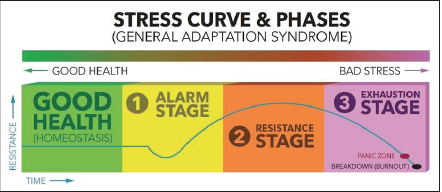As the world continues to reopen it looks like we will have some additional challenges and stress to deal with. How do we best manage this and look after our wellbeing?
Stress is often given negative press and we are continuously under pressure to reduce it. I’m going to encourage you to look at it in a different way. Stress is a necessary part of a life. Without it we wouldn’t achieve our personal and business goals, we wouldn’t be motivated to do anything. In short we wouldn’t get much done.
Back in the 1960s Hans Selye developed the general adaptation to stress model and its phases.
Good Health – Homeostasis This is when your body is in balance and isn’t being pushed or changed by the environment…i.e. no stress.
Alarm Stage – Thinking/Readying for the future
This is a state of heightened awareness, often related to increased speed of thinking, higher attention and higher state of arousal generally. However, nothing is happening yet, you are only readying yourself for something to happen. For example, anticipation before a big meeting or just before you start a race.
Resistance Stage – The doing part of putting stress on your body
This is when you take action, and make your body adjust and cope with the environment. You are in the meeting or race and using fuel, and your body is resisting the stress. For example, doing a workout and pushing through to the end. It was stressful, but your body resisted and got through it. Going without sleep for a week, even though you’re tired, you push through, using stress hormones to stay on point.
Exhaustion Stage – Energy levels have been drained and your body goes into shutdown
This could be at the end of a very long day, or month, or year of work. Your body has had enough, it demands rest and gets it through shutting down and making you feel exhausted. For example, working hard for months leading up to a holiday and you get very sick as soon as the holiday starts.
You can cycle through these levels in one day (mini-cycle), or over a longer period of time of months or years (macro-cycle). Which phase are you in and how long have you been in it?
The key to managing the phases and avoiding the exhaustion stage is quite simple. Plan your recovery.
Maybe we shouldn’t be feeling more stressed trying to reduce our stress. We go to the gym to stress our body and break it down. This is a positive thing. What most of us miss is that we get stronger in recovery and that we need regular recovery for our body to get stronger. If I go and run a marathon this weekend and then try and run another one tomorrow it is very likely that I will be weaker as I haven’t yet recovered. Plan a good period of recovery and it is very likely that my body will become stronger and I will be stronger for my next marathon.
How much recovery have you got in your business week?
Your business week is no different from the gym and marathon example. If you load your week with back to back meetings, presentations and work and spend most of it in the resistance stage at some point you will hit the exhaustion stage and burnout.
This can be easily avoided if you plan in some recovery. Think of the alarm stage as preparing, the resistance stage as taking action and the exhaustion stage as resting. Cycling through the 3 will help us manage stress and improve our wellbeing. What recovery have you planned this week, what would it be, and when was the last time you were in the preparing phase?


